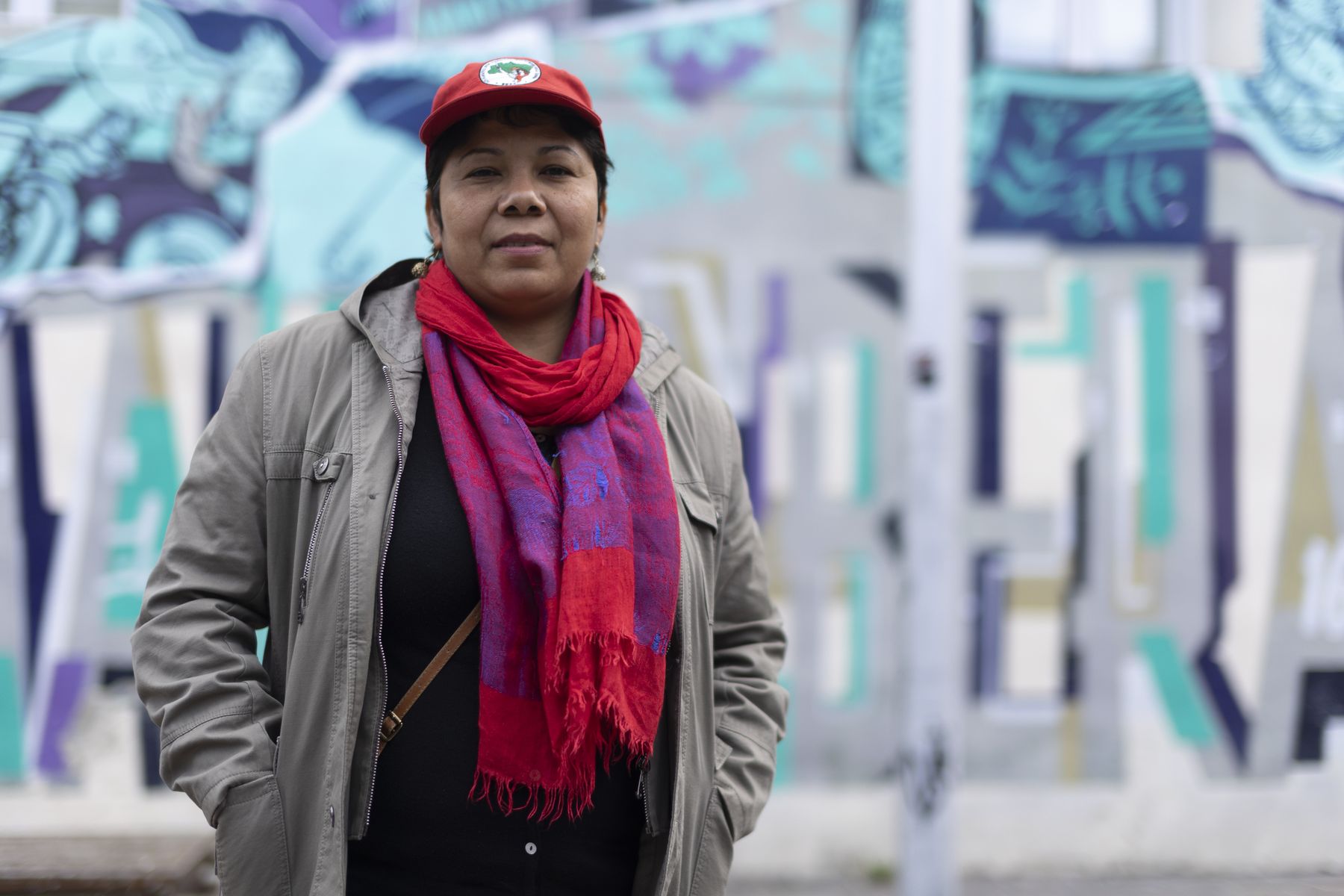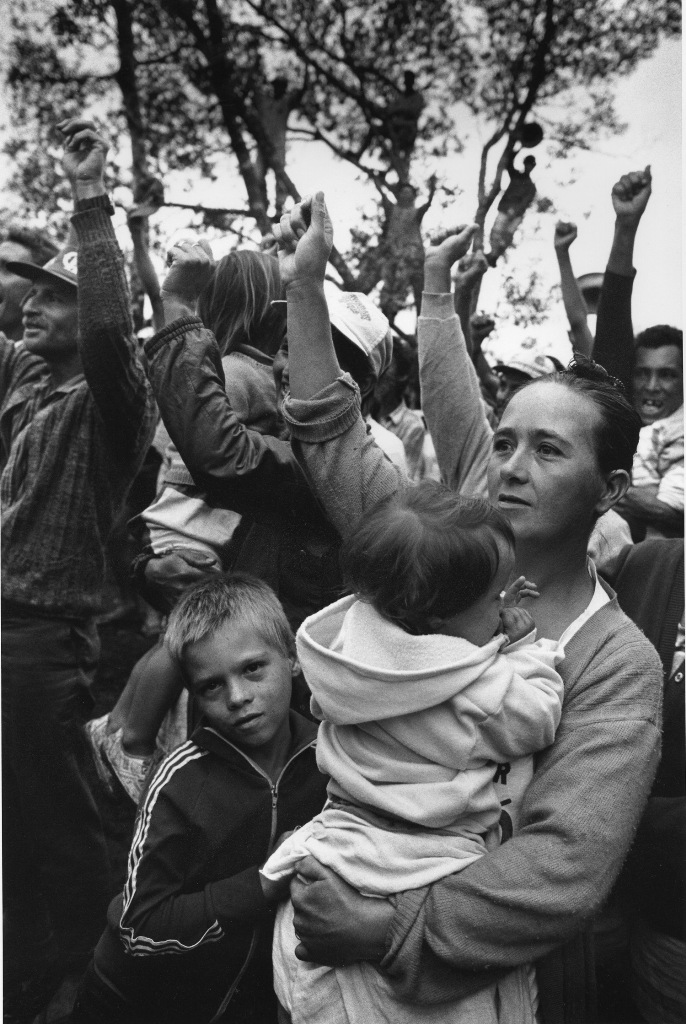“The future of mankind is to create food without agrotoxics”
- Rosana Fernandes is the third girl from eight impoverished peasant families in the Brazilian state of Mato Grosso. Member of the MST (Movimento dos Trabalhadores Rurais Sem Terra) and political pedagogical coordinator of the Florestán Fernandes School. During these days he has travelled Euskal Herria giving lectures invited by the Oinharri School.

How did the Landless Peasant Movement emerge?
MST is the continuation of the struggle for land in Brazil. For 521 years, since the resistance of the primitive peoples, there have been many struggles in the defense of the land. In official history, the Portuguese discovered Brazil, vacated as an empty territory. Then, joined to the earth, the slave struggle appeared, very violent, with many martyrs... In this sequence, the MST emerged in the midst of the military dictatorship in a reorganization of the Brazilian popular movements: on the one hand, the creation of the Central Unico dos Trabalhadores and the Partido dos Trabalhadores, on the other hand, the creation of the Central Unico dos Trabalhadores and the Partido dos Trabalhadores, on the other hand. The MST was born in 1984 at a meeting held in the state of Paraná.
And how did you get in?
My father has always been working on the farms of the region, so I was struck by the seed to enter the MST, the second region of Mato Grosso that began working in the MST. He was sixteen years old and intervened in the Catholic Church's Youth Ministry, in the grassroots communities. The MST was seeking refuge in these spaces, and I helped to create these alliances to organize families and occupy the grounds. Meanwhile, I also separated the student and worked as a secretary at a human rights center. My parents took it with mistrust at first, but eventually I understood what the goal of MST was and that there was my place.
Were your parents against?
Yes, although MST talked to families, my parents didn't know what it was. When they saw that he occupied the lands and I was in the middle, they didn't like it very much. They understood it later, some sisters and their mother lived there since then, until their father died three years ago. I have two daughters aged 15 and 10, and my 23-year-old son is also working with MST.

What was that first occupation like?
It was very tense. It was a very large latifundium occupying 1,503 families. My parents forbade me from being with the families in the camp, but I didn't abide by it. I made a cadaster, it's important for the Land Reform, so that the family can live there and cultivate the land. In that occupation, I joined the movement. Our occupation took place on 9 April 1996 and very shortly thereafter, the 17th was the massacre in Eldorado, in Carajás, in the state of Pará. Nineteen workers were killed. Since 2007, it has been the International Day of Peasant Struggle. The MST struggle became apparent and the families participating in our occupation were very frightened. In the end, as a result of that massacre, the Minister of Agriculture resigned and the government accelerated the negotiating process. In six months, 1,503 families acquired the land.
What have you been to since MST?
During those six months there were negotiations, the MST invited me to participate in the secretariat of Mato Grosso. I didn't think twice. I was getting ready to be a nun, I was young and it was an opportunity to go out and study outside. I changed this idea, and at 17-18, I left my family to join the MST. For the last 25 years I have experienced many phases: a base militant occupying lands, secretary of state, educators in the education sector, literacy of young people and adults, then I went to the state of Goias to organize the movement, especially in the educational field, I was a delegate of Goias for six years in the National Directorate, and in 2014 I was the political coordinator of the Florestán Fernandes school, at a, at the beginning of seven years. I'm also studying, doing a PhD in Florestan Fernandes, related to the university of Sao Paolo.
What is the key to the duration and extension of MST?
Brazil is very large, with 850,000 square kilometers distributed in 27 states. It is present in MST 24, each State has special characteristics, but the symbolism and three principles of the MST are common to all: the struggle for decentralization and democratization of the land; the struggle for the Land Reform to work and achieve dignified living conditions – education for children and adults, infrastructures (water, sanitation, road, investment in productive development), social transformation… and the project of the socialist revolution.
We work the three objectives together, they do not go one before the other, and so we have been building our identity in Brazil and internationally.
And how do they develop
relationships internally?Leadership and coordination centers are collective and bottom-up. Communities decide on their representative and so on, leaders do not decide. Our main centre of power is the National Congress and it is the responsibility of Community representatives to link to its guidelines. We are 400,000 families, for example, at the 2014 Congress, 17,000 workers participated. However, political debates and decisions have been taken earlier in the communities.
Collective identity is very important to you, right?
Yes, in all the tasks there is a collective that cares. I am responsible for the coordination of the Florestán Fernandes school, for example, but I do not take it myself, the collective is with me. That is the guarantee for collective management. Work is for everyone and everyone is involved in decisions. Planning is also general. Both the meetings and an occupation must be planned beforehand: food, transportation, secretariat, organization of families and camp, day care, anticipation of possible conflicts, tactics of resistance...
Militancy itself is a profession. It takes time, project organization, energy, responsibility capacity: it's not just a hobby, you have to give the best of you. We attach great importance to training. We have to learn constantly. Saying “I don’t have to learn anymore” doesn’t get into our minds. We adhere to historical materialism, but Marx, Lenin, Gramsci, Freire, Florestan Fernandes -- we can't understand ourselves on the surface, help us to understand the current reality, to become aware of the theory, but they wrote at the time, and we have to go deeper.
How do they relate to other organizations?
We build alliances with social movements, political parties, institutions, with our own voice. We have an intensive network of support and solidarity. During the pandemic, the MST distributed four million tons of agro-ecological food in the impoverished pearls of the cities, in the sense of the solidarity we received. And we continue to literate the population, in Brazil there are still 14 million illiterates, we have also resorted to cities to carry out literacy campaigns using the method I can learn from Cuba.
And at the international level?MST
is one of the main creators and drivers of Via Campesina, and we are also working with more organizations that are not there. At the recently created International Peoples’ Assembly we are thinking of projects for the world working class, not in the capitalist sense, but as conservatives of biodiversity which is a common good: water, land, minerals...

Also through school, right?
Yes, the MST decided in 1996 to build a training space that could be a reference for Brazil, Latin America and other continents. The Florestán Fernandes school currently has 30 courses, seminars and workshops, 40,000 people between 2005 and 2019 and 500 volunteer teachers. In addition to mere academic activity, we address cross-cutting issues such as history, economics or agriculture. Training is not just reading many books, but in the end we are human beings, we have to live together, we come from very different realities and systems, so through art, culture or music we fight against bad values (machismo, homophobia, pride, personalisms). We need self-criticism that makes us new women and men for a new society.
What kind of people come to school?
We have special courses for MST militants, others along with city militants, other international courses, especially for Latin America, and even in English. People cannot come individually, but from some group, because when they return to their country we seek the collectivization of what they have learned. At least half of the group should be composed of women. We have spaces for boys and girls, and as mothers are educated, we work with boys and girls.
Going back to MST, how much land have you conquered?
I don't know exactly how many of them are, but we're 400,000 families, spread over millions of hectares. In addition, this is not limited to MST, there are about 90 popular movements that conquer the ground.
What relationship do they have with the people of origin?
According to the states, we are often very close to the people of origin and we fight together. The Government now wants to adopt a law to expel from the territories that have historically belonged to the peoples of origin. In addition, the consequences of the pandemic have been many and some of them have feeding problems.
Has Jair Bolsonaro's influence been great?A
strong offensive begins to privatize the settlements, moving from communal to private property, so that everyone can do whatever they want with their plot. When we conquer the land, it is to cultivate it, not to sell it. Doubts and conflicts have arisen within the movement, and the Government wants to lead to division.
How do I know the situation in Brazil in general?In 2016
we set the beginning of the new offensive with the coup d'état against Dilma Roussefe. They oppose the working class and the PT party. In the 2018 elections Bolsonaro won the victory through moralist and fascist speeches, with many faces news, even speaking on behalf of the family and God, along with the evangelical and Mentekoste churches.
What is the future of peasant struggle?
It is necessary to establish a new model of agricultural production, which in the case of the MST we call the Popular Rural Reform, focused on the production of healthy foods. The future of mankind is based on the ability to generate food without agrotoxics for society as a whole, preserving nature: land and water do not bear so much agrotoxics.
Lur Gil kazetaria eta Askapena talde internazionalistako kidea da. MSTko Florestan Fernandes eskolan ikasten ari da. Ostiralean Brasilgo Polizia eskolara tiroka sartu zenean, han zen bera nazioarteko beste hainbat ikaslerekin batera.MSTren aurka eta, oro har, Brasilgo herri... [+]
Brasilgo Lurrik Gabekoen Mugimenduko Florestan Fernandes (ENFF) formakuntza eskolara sartu dira dozenaka polizia. ENFFn Brasilgo eta kanpotik joandako lagun askok ikasten dute. Oldarraldia gertatu den unean Askapenako kide bat han zegoen. Onik dagoela adierazi du.
Hamar urte daramatza Florestan Fernandes Eskola Nazionalak, eta 30 Lurrik Gabeko Landa Langileen Mugimenduak (MST). Esperientziatik sortzen da, badu zergati eta zertarako bat.
Eskola bizipen eraldatzailea da Florestan Fernandes Eskola Nazionalean.
















